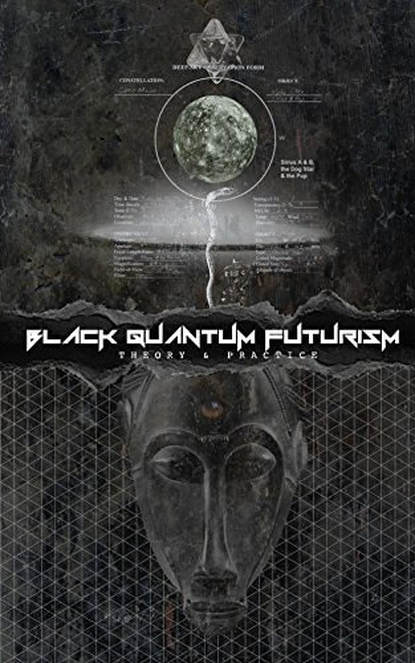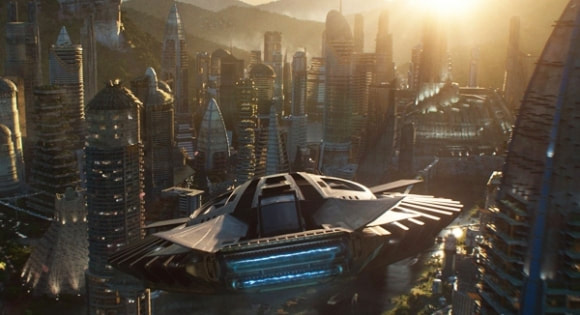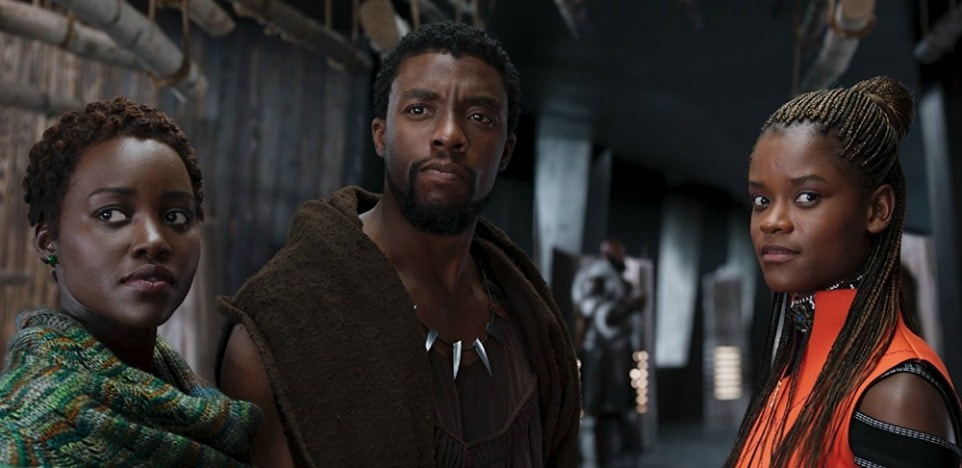|
|
Black Panther
Metaphysics, Music and Plot
"what happens now determines what will
happen to the rest of the world"
You may think of Black Panther as an adventure movie. It is. One way to think of the metaphysics of Black Panther is in terms of a battle between the forces of good and evil. But there is something more than the battle: namely the sense that, after all, the future is not fully defined by the past, no matter how traumatic, and that it carries within it possibilities for hope, including and perhaps especially Afrofuturist hope. For me, as an American of European descent, this hope is one of the best we have. The patterns of Eurocentric thinking, including its epistemological assumptions that we live in a universe entirely determined by past events, has brought so much of the world into collapse. The Afrofuturist hope is articulated deeply by Black Quantum Futurism, about which you read below. Black Quantum Futurism is the result of a collaboration between Camae Ayewa and Rasheedah Phillips. It is an imaginative, prophetic, and practical expression of the idea, important in Open Horizon thinking, that an open future is part of the very fabric of each present moment, and that acts of the imagination can fill that future with possibilities which, if actualized in practical ways, bring into existence new ways of living and new modes of consciousness. In the present moment, so Open Horizon thinkers believe along with Black Futurists, the inherited actualities of the past (some deeply traumatic) and the not-yet-actualized possibilities for the future (some liberating) are co-present such that the very experience of time can be one of imaginative simultaneity. The traumas can be re-membered for the sake of transformative healing, and amid the re-membering fresh possibilities arise in the very yearning for alternatives. In the simultaneity of the present, there is both anger and hope: prophetic denunciation and prophetic annunciation. With its many projects, Black Quantum Futurism shows the importance of the arts (writing, music, film, visual art) in evoking and nurturing the kinds of consciousness needed for this experience of imaginative simultaneity. Its music and spoken word poetry, for example, are the metaphysics of justice in sonic form. And there's also the book on Black Quantum Futurism: Theory and Practice, edited and introduced by Rasheeda Phillips and Moor Mother Goddess. (Jay McDaniel)
Metaphysics
What is Black? What is Black Quantum Futurism? |
Rasheeda PhillipsWhat is Futurism? |
Music
NPR's Rodney Carmichael discusses the music:
below are some excerpts from Rodney Carmichael's essay
MTV Interview |
Envisioning an Afrofuturist Multiverse"Its equally ambitious plot attempts to reconcile a divide, both figurative and literal, that scattered Africans throughout the diaspora — a heroic attempt to rectify 400 years of racially fraught history, while envisioning an Afrofuturist multiverse on the way to box office domination. Even in the fictional land of Wakanda, a course correction that significant could take several sequels to rectify." (Rodney Camichael, NPR, 2/21/2018) Belonging to Africa"I felt like I belonged in Africa," Lamar told Andreas Hale last year in an interview for The Recording Academy in May, 2017. "I saw all the things that I wasn't taught. Probably one of the hardest things to do is put [together] a concept on how beautiful a place can be, and tell a person this while they're still in the ghettos of Compton. I wanted to put that experience in the music." (Rodney Camichael, NPR, 2/21/2018) A Continuing Redemption Song"If 1915's Birth Of A Nation, with its racist depiction of African-Americans, predicated a century-long struggle against violent white supremacy in this nation, the movie Black Panther, 100 years later, projects a new narrative with the attempted reclamation of a scattered black diaspora. Lamar's soundtrack is a necessary note in that (continuing) redemption song." (Rodney Camichael, NPR, 2/21/2018) |
Plot
Film Review by Frederic and Mary Ann Brussat
of Spirituality and Practice. Originally published in S&P.
What is a nation? What values does it stand for? Is it possible in this day and age for a country to be isolationist, ignoring the challenges and the needs of the rest of the world? Do powerful and rich countries have a responsibility to help others? Should the resources and intellectual talent of the nation's best and brightest be used to craft solutions to problems or to build bigger and better weapons? Is it ethical to engage in arms sales? Are those who arm the oppressed seeking justice or creating havoc?
These are not the kinds of questions you'd expect to ask after seeing a Marvel superhero movie. But they are driving forces in Black Panther, directed by Ryan Coogler from a script he wrote with Joe Robert Cole from characters created by Stan Lee and Jack Kirby.
The nation at the center of attention is Wakanda. The world largely ignores what is thought to be just another poor country in Africa. That's because its rulers have for centuries kept hidden from the outside world the fact that it is actually a technologically advanced civilization built from a rare and very powerful metal called vibranium. They rightly believe that if colonialists knew about it, they would invade to take it over. After all, Africa has been raped for its resources throughout history.
A conflict over Wakanda mission and future drives a very involving storyline. T'challa (Chadwick Boseman) returns from the United States to Wakanda upon the death of his father to take his place as king. His mother (Angela Bassett) assures him he is ready for this role because he is a "good man with a good heart." His little sister (Letitia Wright), a scientist and tech inventor (think M in the James Bond movies) has all the tools he needs to succeed. An immediate challenge comes from Nakia (Lupita Nyong'o), the love of his life who has been working as a spy in the outside world. She wants him to commit to helping the poor and disadvantaged with Wakanda's riches.
He soon faces two other challenges to his beliefs about Wakanda's role in the world. He learns that Ulysses Klaue (Andy Serkis) has gotten a sample of vibranium, which he is about to sell on the international arms market, despite the efforts of CIA agent Everett Ross (Martin Freeman). And Erik Killmonger (Michael B. Jordan) arrives, carrying with him a claim to the throne and all the anger, resentment, and scars resulting from living on the margins of American society. He wants to arm black people with vibranium weapons so they can overthrow their oppressors. To make it all more difficult, T'challa realizes this young man is a monster of his family's own making.
Because this is, after all, a Marvel Cinematic Universe film, there are plenty of fights, car chases, rocket-bearing planes, and other combat scenes. Perhaps the scariest are two physical challenges to the king fought in a pond on the edge of a waterfall cliff.
What makes Black Panther different from other Marvel films is the attention to details of telling a story, the development of characters who are conflicted and unpredictable, and its exploration of issues that have contemporary relevance. This is more than a good-versus-evil flick. You may come away from it reveling in the outcome of the battles, but you will also find yourself thinking about what it means to choose peace and service of the poor.
These are not the kinds of questions you'd expect to ask after seeing a Marvel superhero movie. But they are driving forces in Black Panther, directed by Ryan Coogler from a script he wrote with Joe Robert Cole from characters created by Stan Lee and Jack Kirby.
The nation at the center of attention is Wakanda. The world largely ignores what is thought to be just another poor country in Africa. That's because its rulers have for centuries kept hidden from the outside world the fact that it is actually a technologically advanced civilization built from a rare and very powerful metal called vibranium. They rightly believe that if colonialists knew about it, they would invade to take it over. After all, Africa has been raped for its resources throughout history.
A conflict over Wakanda mission and future drives a very involving storyline. T'challa (Chadwick Boseman) returns from the United States to Wakanda upon the death of his father to take his place as king. His mother (Angela Bassett) assures him he is ready for this role because he is a "good man with a good heart." His little sister (Letitia Wright), a scientist and tech inventor (think M in the James Bond movies) has all the tools he needs to succeed. An immediate challenge comes from Nakia (Lupita Nyong'o), the love of his life who has been working as a spy in the outside world. She wants him to commit to helping the poor and disadvantaged with Wakanda's riches.
He soon faces two other challenges to his beliefs about Wakanda's role in the world. He learns that Ulysses Klaue (Andy Serkis) has gotten a sample of vibranium, which he is about to sell on the international arms market, despite the efforts of CIA agent Everett Ross (Martin Freeman). And Erik Killmonger (Michael B. Jordan) arrives, carrying with him a claim to the throne and all the anger, resentment, and scars resulting from living on the margins of American society. He wants to arm black people with vibranium weapons so they can overthrow their oppressors. To make it all more difficult, T'challa realizes this young man is a monster of his family's own making.
Because this is, after all, a Marvel Cinematic Universe film, there are plenty of fights, car chases, rocket-bearing planes, and other combat scenes. Perhaps the scariest are two physical challenges to the king fought in a pond on the edge of a waterfall cliff.
What makes Black Panther different from other Marvel films is the attention to details of telling a story, the development of characters who are conflicted and unpredictable, and its exploration of issues that have contemporary relevance. This is more than a good-versus-evil flick. You may come away from it reveling in the outcome of the battles, but you will also find yourself thinking about what it means to choose peace and service of the poor.





